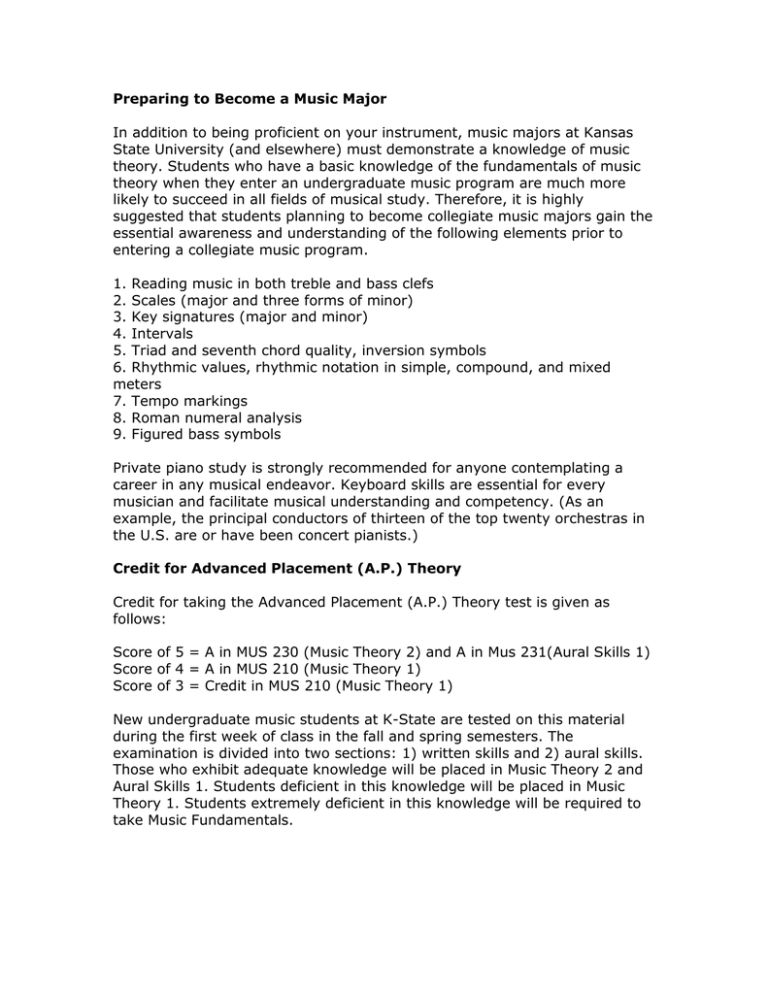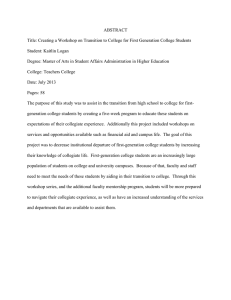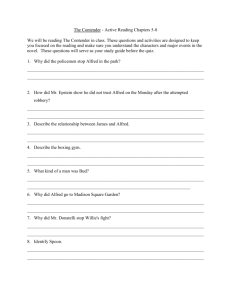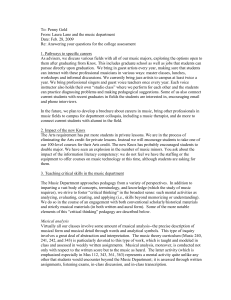Preparing to Become a Music Major
advertisement

Preparing to Become a Music Major In addition to being proficient on your instrument, music majors at Kansas State University (and elsewhere) must demonstrate a knowledge of music theory. Students who have a basic knowledge of the fundamentals of music theory when they enter an undergraduate music program are much more likely to succeed in all fields of musical study. Therefore, it is highly suggested that students planning to become collegiate music majors gain the essential awareness and understanding of the following elements prior to entering a collegiate music program. 1. Reading music in both treble and bass clefs 2. Scales (major and three forms of minor) 3. Key signatures (major and minor) 4. Intervals 5. Triad and seventh chord quality, inversion symbols 6. Rhythmic values, rhythmic notation in simple, compound, and mixed meters 7. Tempo markings 8. Roman numeral analysis 9. Figured bass symbols Private piano study is strongly recommended for anyone contemplating a career in any musical endeavor. Keyboard skills are essential for every musician and facilitate musical understanding and competency. (As an example, the principal conductors of thirteen of the top twenty orchestras in the U.S. are or have been concert pianists.) Credit for Advanced Placement (A.P.) Theory Credit for taking the Advanced Placement (A.P.) Theory test is given as follows: Score of 5 = A in MUS 230 (Music Theory 2) and A in Mus 231(Aural Skills 1) Score of 4 = A in MUS 210 (Music Theory 1) Score of 3 = Credit in MUS 210 (Music Theory 1) New undergraduate music students at K-State are tested on this material during the first week of class in the fall and spring semesters. The examination is divided into two sections: 1) written skills and 2) aural skills. Those who exhibit adequate knowledge will be placed in Music Theory 2 and Aural Skills 1. Students deficient in this knowledge will be placed in Music Theory 1. Students extremely deficient in this knowledge will be required to take Music Fundamentals. Music Theory Preparation The following free website is recommended for preparation of collegiate music study: Musictheory.net: http://www.musictheory.net/index.html lessons = text (as in a book) that explains the material. trainers = interactive exercises to practice material learned in the lesson. Remember to explore all possibilities for each trainer exercise. You can control how easy/difficult the questions will be. The following programmed theory books may also be used for preparation of collegiate music study. These are listed in order of recommendation. As a reference point, these prices were recently found on barnesandnoble.com. • Manoff, Tom. The Music Kit. 4th edition. New York: W.W. Norton, 2000. Includes CD and computer software (with interactive exercises that return personal feedback and scores). ($67.75) The software is Macintosh and Windows compatible. • Clough, John and Joyce Conley. Scales, Intervals, Keys, Triads, Rhythm, and Meter. 3rd edition. New York: W.W. Norton, 1999. Includes CD. ($49.75) • Steinke, Greg and Paul Harder. Basic Materials in Music Theory: A Programmed Course. 10th edition. New Jersey: Prentice Hall Professional Technical Reference, 2002. ($72.00) • Feldstein, Sandy. Practical Theory Complete: A Self-Instruction Music Theory Course. New York: Alfred Publishing Co. Inc., 1997. ($9.95, which is quite inexpensive!) • Surmani, Andrew, Morton Manus, and Karen Farnum Surmani. Alfred's Essentials of Music Theory: Complete. New York: Alfred Publishing Co. Inc., 2000. ($12.50) • Surmani, Andrew, Morton Manus, and Karen Farnum Surmani. Alfred's Essentials of Music Theory, Teacher's Answer Key Book. New York: Alfred Publishing Co., Inc., 2000. ($18.50)


